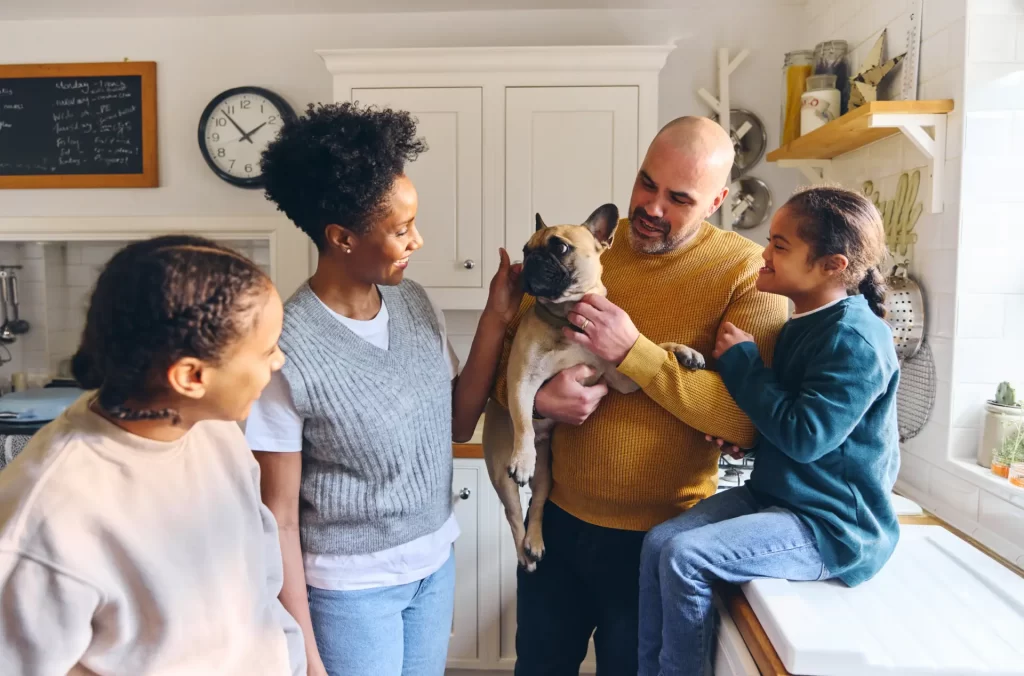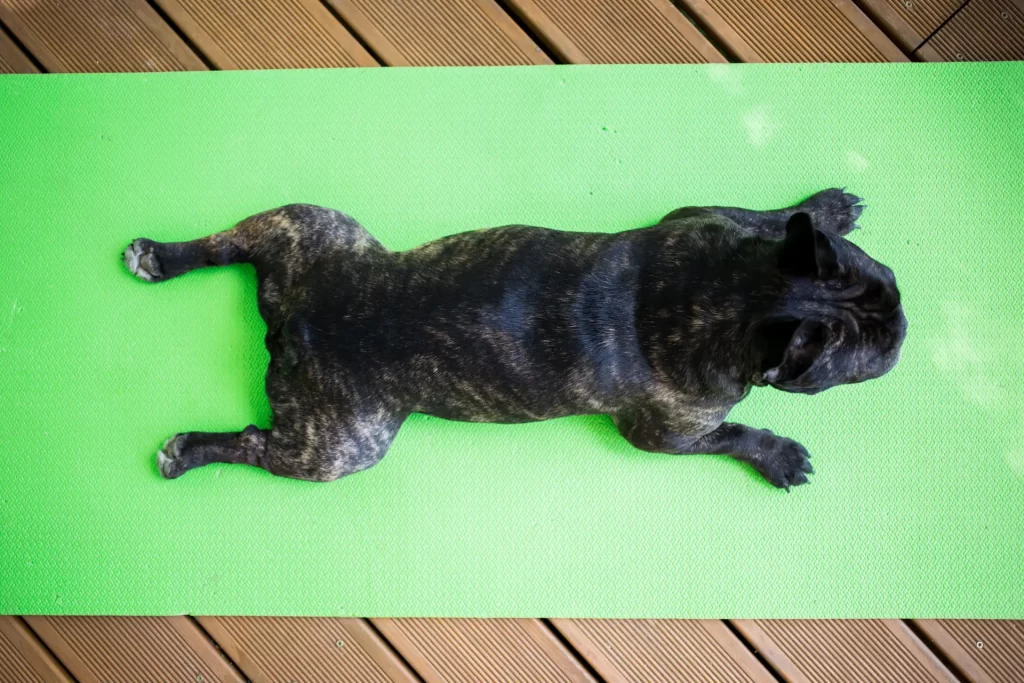Although some decisions in our life are not easy, neutering your Frenchie is a significant decision that may benefit your loved one.
It can help avoid health problems, behavioral disorders, and unplanned puppy litter.
Nonetheless, you may be wondering what to expect following the surgery. The most common question dog owners ask when discussing this topic is: What to Expect After Your French Bulldog Is Neutered?
The shortest answer we can give you immediately would be: Because Frenchie’s bodies no longer produce sex hormones after neutering, they will be less motivated by impulses, making them more controllable and submissive.
This article will examine what occurs after your French Bulldog has been neutered.
We’ll go through any physical or behavioral changes you might see, how to care for your puppy while he’s recovering, and when to call your veterinarian if you have any concerns.

What is the Neutering Procedure?
Before we explain the advantages and disadvantages and how to manage and care for your Frenchie after surgery, we must briefly walk you through what a neuter is.
Neutering, often known as castration, is a surgical treatment that removes a male dog’s testicles.
A tiny incision typically removes the testicles in the scrotum while the puppy is under general anesthesia.
As you can guess, your Frenchie will need some time to recuperate and heal after the treatment.
Also, neutering is a routine surgery with several advantages for you and your furry friend.
With the breed’s inherent health problems, choosing to neuter might be crucial for Frenchie’s owners.
In this article, after we’ve done with what neutering is, we will explain the possible benefits of the process and what to expect from your Frenchie’s recuperation.
The Best Timing To Neuter Your Buddy

The optimum time to neuter your French buddy depends on your dog’s breed and unique conditions.
In general, neutering dogs between six and twelve months is advised. But is that also the case for your French friends? Let’s clear all that up right now.
But, depending on your dog’s health and personality, your veterinarian may prescribe neutering at an earlier or older age. This is generally the following question that comes up once you’ve decided to have the operation done.
Because there are so many various points of view and perspectives out there, most Frenchie parents have difficulty selecting when they should do it.
Most veterinarians recommend neutering your Frenchie between 8 and 10 months.
By that age, individuals have reached sexual maturity and have gone through the primary hormonal changes that impact their development.
If your puppy exhibits troubling sexual tendencies, operating sooner may be appropriate. If you wait longer, that is fine; It is never too late to perform the surgery.
Every puppy is unique, so the best thing you can do is find a reputable veterinarian with extensive expertise with Frenchies and talk with them before making a selection.
How Do They Perform The Procedure?
As mentioned, neutering is a standard procedure for removing a dog’s reproductive organs.
The vet will create an incision in the scrotum, remove the testicles, and sew it back up again when castrating male puppies.
When female puppies are spayed, the ovaries and, in some instances, the uterus are removed by cutting their abdomen and sealing it again.
We know this sounds scary, but don’t worry! Your Frenchie will be anesthetized on both occasions so that they will experience no pain or discomfort.
Also, there are more alternatives to the neutering procedure. Currently, mainly created drugs give so-called “chemical castration.”
These drugs can temporarily and reversibly lower your Frenchie’s testosterone levels, similar to a temporary and reversible neuter operation.
If you are satisfied with the behavioral adjustments provided by the temporary remedy, you may schedule the surgical and permanent neutering surgery with your trusted veterinarian.
But, this is only beneficial if you want to cease your buddy hormone-related antics temporarily or if you want to know what to hope for following medical treatment.
What to Expect After Your French Bulldog Is Neutered?

As with any human intervention or surgery, our dear furry pets also must have a specific healing period.
You will need to pay special attention to some things after the surgery of your French buddy, and we are here to present them to you.
Your Frenchie must wear a cone after surgery to prevent them from reaching and damaging the sutures. It’s also critical to keep the scar clean to avoid infection.
Many of our Frenchie parents have stated that they use a surgical suit on their pups instead of a cone, which is an excellent idea because they are much more comfortable and practical.
Although safety is the most important and only then comfort comes along in these situations, be sure that in this article, you will find a combination of both to give your sweetest pup the best treatment after surgery.
Sutures are routinely removed 7-14 days after surgery in male French Bulldogs. But, depending on the particular dog’s recovery process and the veterinarian’s prescription, the duration may vary.
It’s critical to attentively follow your vet’s instructions and monitor your Frenchie’s incision site for any symptoms of infection or problems.
Also, sutures are typically removed in female pups after the surgery after 10-12 days.
Your vet will also prescribe some antibiotics and medicines for your dog.
Be aware that they may cause them to get sleepy and lose their appetite for a day or two, which is normal.
Most importantly, your Frenchie gets enough rest and affection from you.
They usually get back on their feet quickly and without incident. Regarding your dog’s activities, this period may be challenging.
We can all agree that all domesticated dogs have an innate desire to explore and mate with other female dogs.
So it’s no secret that your Frenchie will be calmer and less inclined to roam after being neutered. It’s completely normal and certainly not a reason to be afraid or think something is wrong.
Also, it’s no secret that he lacks the tremendous urge to pursue girls and prefers to stay closer to home.
As a result, don’t be shocked if your pet wants to sleep in your lap or spend the entire day at your side.
Usually, the incision site is free of redness and drainage, although germs can get in. You should see your veterinarian immediately if you see any redness or drainage from the incision site.
While the incision should remain dry, it is advised that you clean up any remaining pee with toilet paper every time your Frenchi buddy goes to release the bladder throughout the recuperation period.
Frenchies need roughly a week to recuperate following anesthesia and surgery, so you must care for them for at least a few days. If you can stay at home, it would mean especially to your sweetest furry friend during this period.
Some dogs may vomit, get exhausted, or lose their appetite due to anesthesia or surgery. Nevertheless, these symptoms usually go away after 1 to 2 weeks.
Frenchie owners worldwide, do you wish to assist your dog in healing more quickly? Here are some tips to help your lovely puppy push through the recovery process as quickly and painlessly as possible:
Inquire about the finest medication for your buddy’s post-surgery discomfort with your veterinarian.
If your Frenchie is an active and hyperactive puppy, keep him calm for at least two weeks. Also, your veterinarian may prescribe sedatives to assist in keeping him calm.
Even though most skin sutures are absorbable, examine the incision site frequently.
As we already mentioned, Skin sutures typically take 7-14 days to dissolve completely. Examine the incision line daily for redness, edema, and discharge.
Wrap the Elizabethan cone, surgical suit, or something your vet recommended around your Frenchie’s neck to protect the incision site. Your dog will attempt to lick it, which may result in an infection, so it is essential to keep him away from the scar.
The Advantages of Neutering Your Frenchie

There are several advantages to neutering your French Bulldog.
First and foremost, neutering can aid in the prevention of particular health concerns, including testicular cancer and prostate disorders.
It can also help lessen the probability of behavioral issues like aggressiveness and disobedient wandering.
Moreover, neutering can help limit the number of unwanted puppies, which is especially significant for owners who do not wish to breed their puppies.
Urine marking, male-to-male aggressiveness, humping, and wandering are the four most common undesired male behaviors among French Bulldogs and male puppies in general.
Some of these habits are amusing, some are humiliating, and still, others have the potential to be deadly. Frenchies can communicate their sexual displeasure in a variety of ways.
Here is a list of the advantages of neutering your furry buddy:
- Prostate problems
Prostate issues (enlargement, cysts, and infections) affect 80% of intact male Frenchies.
They are not life-threatening, but they necessitate costly comprehensive therapies. Neutering helps to reduce the occurrence of prostate problems.
- Testicular problems
Infections and malignancies of the testes are odd, but when they occur, they are challenging to treat. These conditions need long-term antibiotic therapy for your buddy.
It’s no secret that tumors form in around 7% of intact canines. Castration is required, as is chemotherapy and radiation if the disease has spread.
Having your French buddy neutered eliminates the danger of testicular problems.
- Fistulas anal and perianal
Perianal and anal fistulas begin as deeper infections but gradually develop canals that connect them to the outer world.
Such canals usually appear as carbuncles in the anal and perianal regions.
This terrible and overpowering illness of Frenchies necessitates lengthy therapy and has a recurring tendency.
Here is the significant advantage of neutering: Neutering substantially reduces the risk of perianal and anal fistulas.
If your loved one is not neutered and develops this problem, your veterinarian will propose neutering as part of the treatment plan.
- Tumors and venereal illnesses
Venereal illnesses and malignancies are relatively prevalent in French Bulldogs who are mated.
But these illnesses are generally challenging to treat and may need intensive and sophisticated treatment strategies (strong antibiotics, surgery, chemotherapy).
Because a neutered Frenchie can’t reproduce, there are no venereal infections or malignancies.
- Improved immune system
Some studies and available online data support that neutered dogs have more vital immune systems and are less vulnerable to infectious illnesses due to unknown underlying causes.
Final Thoughts
Well, we’ve come to the very end of this article, so it’s time to summarize everything that’s important for every Frenchie parent.
So, the question we talked about today was: What to Expect After Your French Bulldog Is Neutered?
And as we said at the beginning, the most accurate answer would be: When our Frenchies do not produce sex hormones, they will have less desire to interact with females, and they will be easier to control and more obedient.
Finally, neutering your Frenchie is a personal decision that must be carefully considered. Nonetheless, it might offer several advantages for you and your loved one.
We hope you enjoyed gathering new knowledge with us on the FrenchieGlobe blog as much as we enjoyed preparing this content for you!




